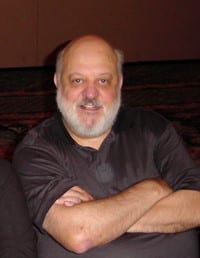2018 IEEE Rosenblatt Technical Field Award Lecture

Enrique Ruspini
Palo Alto, California 94306, USA
E-mail: e.ruspini@ieee.org
Similarity and Fuzzy Logic in Cluster Analysis
The ability to recognize similarities between objects, situations, and concepts is the basis of an important class of cognitive processes known as analogical reasoning. The notion of similarity and its related notion of graded preference have been shown to provide an interpretation of the basic concepts and methods of possibility theory—notably the key procedure known as generalized modus ponens. The interpretation of possibilistic constructs by Ruspini in 1991 in terms of similarity concepts led to the subsequent development of a number of approximate-reasoning methods further extending their classical logic counterparts.
The concept of similarity also plays a significant role in classification processes that seek to discover structure in data. Following the initial work of Ruspini in 1969, establishing cluster analysis as the identification of fuzzy partitions with optimal properties, a large number of methods have been developed based on the idea of mapping metrics into partitions.
In this presentation we aim to bring together our previous work on similarity-based interpretations of fuzzy logic and on relational clustering in the context of issues and methods for hierarchical clustering. Our point of departure will be the extension of similarity measures between points to one between crisp sets of the sample space through a process that is dual to that leading to the well-known Hausdorff extension of distance measures. We will present then an extension of this measure to a similarity measure between fuzzy sets of the dataset.
Having established a similarity structure between fuzzy sets we will present metric properties of curves connecting fuzzy subsets of the sample space. We will then propose a methodology, grounded on the original similarity structure, for the derivation of taxonomical trees on the basis of properties of these curves. In closing we will present applications of these ideas and discuss future research directions.
Biography
Enrique H. Ruspini received his degree in Mathematics from the University of Buenos Aires, Argentina, in 1965 and his doctoral degree in System Science from the University of California at Los Angeles in 1977. He is a well-known speaker and consultant and has collaborated with numerous organizations throughout the world. Dr. Ruspini has held positions at the University of Buenos Aires, the University of Southern California, UCLA’s Brain Research Institute, Hewlett-Packard Laboratories, the SRI International Artificial Intelligence Center (Principal Scientist), and the European Center for Soft Computing (Director, Collaborative Intelligent Systems Laboratory).
Dr. Ruspini is one the earliest contributors to the development of fuzzy-set theory and its applications, having introduced its use to the treatment of numerical classification and clustering problems. He has also made significant contributions to the understanding of the foundations of fuzzy logic and approximate-reasoning methods. His research has also focused on machine learning, intelligent systems for advanced sensing and control, approximate and uncertain reasoning, distributed artificial intelligence (multiagent collaborative teams), artificial olfaction, information fusion, pattern recognition, information retrieval, qualitative description of complex objects, and knowledge discovery and pattern matching in large databases.
Dr. Ruspini is the recipient of the 2018 IEEE Frank Rosenblatt Technical Field Award and of the 2009 Fuzzy Systems Pioneer Award of the IEEE Computational Intelligence Society. He is a Life Fellow of the IEEE, a First Fellow of the International Fuzzy Systems Association, a Fulbright Scholar, a European Union Marie Curie Fellow, and a SRI International Fellow. In 2004, he received the Meritorious Service Award of the IEEE Neural Networks Society for leading the transition of the Neural Networks Council into Society status. He is one of the founding members of the North American Fuzzy Information Processing Society (NAFIPS) and the recipient of that society’s King-Sun Fu Award. Dr. Ruspini was also the Editor in Chief (together with P.P.Bonissone and W. Pedrycz) of the Handbook of Fuzzy Computation and a member of the Advisory and Editorial Boards of numerous professional journals.
Dr. Ruspini has been an active IEEE volunteer, officer, and leader for over 25 years. He is a former member of the IEEE Board of Directors and Past-President (President-2001) of the IEEE Neural Networks Council (now Computational Intelligence Society). He has occupied numerous positions at the NNC, NNS, and CIS, was a CIS Distinguished Lecturer, NNC Vice President for Conferences (1999-2000), and CIS Vice President for Finance (2013–2018). Dr. Ruspini was the General Chair of the Second IEEE International Conference on Fuzzy Systems (FUZZ-IEEE’93) and the 1993 IEEE International Conference on Neural Networks.